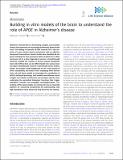Building in vitro models of the brain to understand the role of APOE in Alzheimer’s disease
Author(s)
Pinals, Rebecca L; Tsai, Li-Huei
DownloadPublished version (2.001Mb)
Publisher with Creative Commons License
Publisher with Creative Commons License
Creative Commons Attribution
Terms of use
Metadata
Show full item recordAbstract
<jats:p>Alzheimer’s disease (AD) is a devastating, complex, and incurable disease that represents an increasingly problematic global health issue. The etiology of sporadic AD that accounts for a vast majority of cases remains poorly understood, with no effective therapeutic interventions. Genetic studies have identified AD risk genes including the most prominent,<jats:italic>APOE</jats:italic>, of which the ɛ4 allele increases risk in a dose-dependent manner. A breakthrough discovery enabled the creation of human induced pluripotent stem cells (hiPSCs) that can be differentiated into various brain cell types, facilitating AD research in genetically human models. Herein, we provide a brief background on AD in the context of<jats:italic>APOE</jats:italic>susceptibility and feature work employing hiPSC-derived brain cell and tissue models to interrogate the contribution of<jats:italic>APOE</jats:italic>in driving AD pathology. Such models have delivered crucial insights into cellular mechanisms and cell type–specific roles underlying the perturbed biological functions that trigger pathogenic cascades and propagate neurodegeneration. Collectively, hiPSC-based models are envisioned to be an impactful platform for uncovering fundamental AD understanding, with high translational value toward AD drug discovery and testing.</jats:p>
Date issued
2022Department
Massachusetts Institute of Technology. Department of Brain and Cognitive SciencesJournal
Life Science Alliance
Publisher
Life Science Alliance, LLC
Citation
Pinals, Rebecca L and Tsai, Li-Huei. 2022. "Building in vitro models of the brain to understand the role of APOE in Alzheimer’s disease." Life Science Alliance, 5 (11).
Version: Final published version